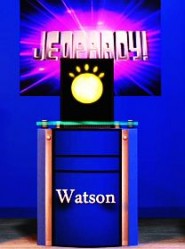IBM"s Watson Could Shake Up The Enterprise
Commercialising Watson has clear and exciting implications for the enterprise, says IBM"s Craig Rhinehart
In February 2011, IBM"s supercomputer project Watson won a special series of the American gameshow Jeopardy, trouncing the two best ever human players.
Even though it signed off one show by guessing that Toronto was an American city, the ambitious supercomputer project demonstrated just how far, with a great deal of time and money, natural language processing (NLP) could go.
Watson was mocked on Twitter for the Toronto gaffe but, to place it in context - which is only right since we"re talking about NLP - the fact is that Watson was way ahead of its opponents and could not lose. And it knew it.
Commercialising Watson
 IBM"s Craig Rhinehart, director of ECM product strategy, compliance and discovery says that the technology in Watson, "Deep Q&A" (question and answer), has immediate and obvious implications for the enterprise in a world, where data is growing at an enormous rate and reaching unwieldy, daunting proportions.
IBM"s Craig Rhinehart, director of ECM product strategy, compliance and discovery says that the technology in Watson, "Deep Q&A" (question and answer), has immediate and obvious implications for the enterprise in a world, where data is growing at an enormous rate and reaching unwieldy, daunting proportions.
That data, for example, could be generated from innumerable contact points with customers - perhaps hours and hours of call centre conversations, written communications, email, website submissions and even Facebook.
This unstructured data - in human language, not computer language - represents about 80 percent of the data hoarded by the enterprise, according to Rhinehart.
And there is valuable information contained within that NLP can unlock, revealing trends and insights to be acted upon.
"There is a tremendous amount of innovation around this notion of unstructured information and we think of Watson as a moment in time, as a grand challenge breakthrough," he said.
Context is everything in natural language - Jeopardy is full of puns and wordplay and this fluid interaction between words is challenging for a computer that relies on precise instructions.
"Watson processes raw information, text and natural language so we can understand what"s in there. With Watson we then put that info into a knowledge base - for want of better word, not a knowledge base per se, but something that manages and stores unstructured info so it"s retrievable in the right context.
"Once you have this built up set of knowledge you can ask questions and get back answers with varying degrees of confidence."
Thirst for knowledge
Watson"s knowledge base for Jeopardy contained around 200 million pages of information, including the complete works of Shakespeare and Wikipedia. Hundreds of algorithms scour its knowledge base for possible answers.
Then, hundreds more algorithms search for supporting evidence and yet more algorithms score each answer based on the supporting evidence resulting in a confidence rating.
On Jeopardy this is all done in three seconds, the speed necessary to buzz in ahead of opponents. For an enterprise working in a specific field, this processing speed and broad knowledge set would not be necessary.
"The really good news is that applying that to an industry takes a lot less time. It would be smaller, because it"s a narrower domain," says Rhinehart.
"Healthcare, for example. What are the trusted sources of information that doctors use and healthcare providers use to make decisions in their business today?
"You would create a similar knowledge set around those sets of information so that you could ask questions and get information in the same way that we did on the game show."
The legal profession could obviously benefit from Watson-like technology too, gaining access to a vast, self-contained database filled with information relating to litigation, protecting intellectual property, writing contracts or negotiating an acquisition.
Decision making
 Rhinehart is keen to impress that Watson, in its commercial form, would be a decision support tool, not a search tool.
Rhinehart is keen to impress that Watson, in its commercial form, would be a decision support tool, not a search tool.
"The user has to distil their query down to a few keywords," he said, which can be taken out of context.
"Watson puts the burden on the technology - ask a natural language question and Watson will dissect the question, preserve the context and bring back relevant potential answers including a confidence rating."
Thus users can focus on making a decision and not sifting the results returned by a search engine for information to support their hypothesis.
Somewhere in the future
For the enterprise, a pure decision-making Watson is still somewhere in the future, says Reinhart, but IBM"s content analytics does use the same core natural language technology.
Japanese telecoms firm NTT, for example, trawled through customer information from call centre notes, voicemails, email and paper, looking for the bigger picture of what customers were saying to them.
From there it spotted opportunities to increase revenue and decrease churn. As a result it introduced a loyalty scheme and mitigated roaming charges by installing kiosks at airports where customers could pick up a phone to use abroad and return it on the way back.
Police in New York were able to solve a robbery case thanks to greater visibility of information contained in investigative reports afforded by content analytics. And Watson-like technology is making huge strides in US healthcare.
Content management and analytics is of course an important space for IBM. It estimates that 15 petabytes of new information is created every day, 80 percent of which is unstructured, so there is clearly great value in technology that makes sense of it.
There is of course an element of vanity in a project like Watson but if IBM"s estimates that 80 percent of the 15 petabytes of new information that is created daily are correct then the technology"s potential value is clear.
Says Rhinehart: "Our strategy in this space is to help our customers manage that information, leverage that information and govern it. Whether Analysing social media or Watson-like apps, we"re providing the tools to enable them to do that and apply it to a business problem they need to solve."
